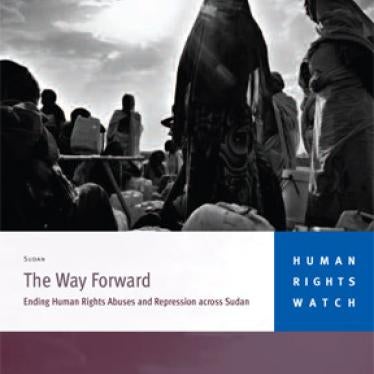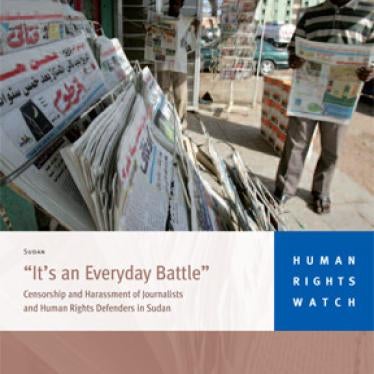(New York) - A report released on November 5, 2009 by the United Nations Panel of Experts on Sudan reveals continuing human rights violations in Darfur and underscores the urgent need to reform Sudan's repressive national security law, Human Rights Watch said today.
The panel of experts, producing its sixth report in four years, once again concluded that the Sudanese government and rebel groups violated the UN arms embargo and international humanitarian and human rights laws. In addition to describing attacks by government and rebel forces on civilians in 2008-9, the UN report highlights the prevalence of sexual and gender-based violence by government soldiers and militia and describes a pattern of arbitrary arrests and detention, physical abuse, and torture of Darfuri activists by Sudanese government security officials.
"If the national elections planned for April, less than six months away, are going to have any credibility as being free and fair, Sudan needs to reform this law immediately," said Georgette Gagnon, Africa director at Human Rights Watch. "For years this law has been a tool of state oppression."
The 2005 Comprehensive Peace Agreement, which ended more than 20 years of civil war, calls for national elections and law reforms as part of a process of "democratic transformation" over a six-year interim period, at the end of which the people of southern Sudan are to vote on self-determination.
In recent weeks, the ruling National Congress Party and southern Sudan People's Liberation Movement (SPLM) - the two parties to the Comprehensive Peace Agreement - have been deadlocked over reforms called for under the peace agreement. In October, the SPLM and an alliance of northern opposition parties walked out of parliament because they objected to a draft national security bill endorsed by the ruling party that retained broad powers of arrest, detention, search and seizure, and immunities for national security personnel.
A new version of the national security bill is expected to be discussed in parliament before the end of the month.
The current law, the 1999 National Security Forces Act, allows security officers in the National Intelligence and Security Services (NISS) to arrest and detain people without charge for up to nine months, and without judicial review for six months. It also grants them broad powers of search and seizure, and contains immunity provisions that shield them from prosecution for abusive practices.
Human Rights Watch has urged Sudanese lawmakers to limit the broad powers of arrest, detention, and search and seizure; and to include key safeguards such as the right to be informed promptly of any charges, the right to be brought promptly before a judge, and the right to be tried within a reasonable time.
"Sudanese lawmakers should pass a bill that upholds the right to a fair trial as guaranteed in the Sudanese constitution," said Gagnon. "They should also remove legal immunities so that human rights violators may be prosecuted for their crimes."
On October 25, national security forces arrested a Darfuri student leader for protesting university fees. After interrogating him for several hours and beating him severely, security officers dropped the student off in a public place at 2 a.m. Another well-known Darfuri activist, arrested in Khartoum in August by armed security officials remains in detention, without charge.
Human Rights Watch has documented the increase in arbitrary arrests and detention of Darfuris following a May 2008 rebel attack on Omdurman, and the heightened censorship and harassment of human rights activists in the period leading up to the International Criminal Court arrest warrant for President Omar al-Bashir in March. The repression of Darfuris and those who speak out on Darfur has also continued in recent months.
The UN Panel of Experts report describes severe beatings of Darfuri civilians by government security officers "with hands, fists, and boots and other objects, flogging with rubber hoses, burning with coil heaters and other electric instruments, forcing detainees to swallow extremely hot water, sleep deprivation and suspending detainees by ropes in stress positions, all in order to extract confessions or to humiliate detainees."
The UN Security Council established the Panel in 2005 to monitor implementation of a UN arms embargo and targeted sanctions, and to report on individuals who impede the peace process, are responsible for offensive military over-flights, and who violate human rights and humanitarian law.
"National security officials have long been implicated in human rights abuses, in large part because the 1999 security law lets them violate human rights with no fear of punishment," Gagnon said. "The government should reform this law urgently to create conditions necessary for holding free and fair elections next year."








